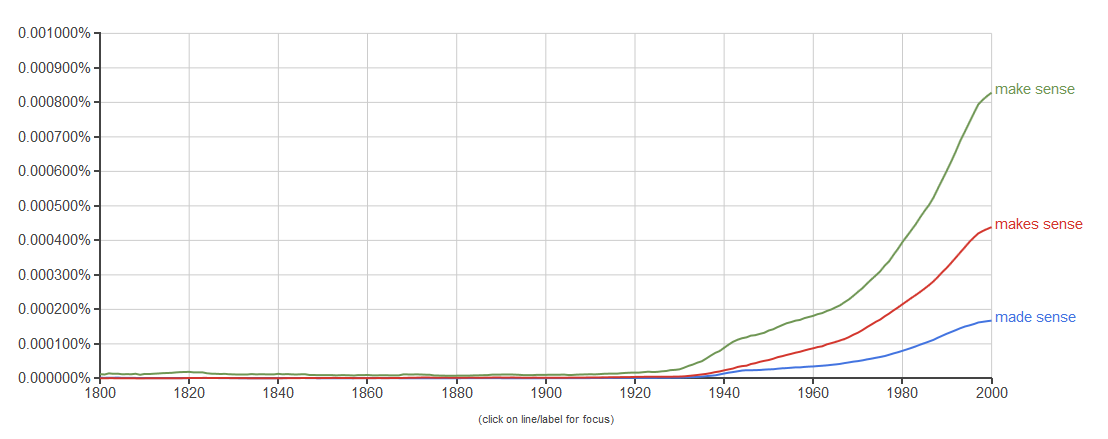At the “Poetry and Happenstance” conference last Friday, there was a question from the floor about a line break in William Wordsworth’s long poem The Excursion. The lines are from Book IV:
The light of love Not failing, perseverance from their steps Departing not, for them shall be confirmed The glorious habit by which sense is made Subservient still to moral purposes, Auxiliar to divine.
A lot has been said about Wordsworth’s line breaks. This particular questioner noticed the remarkable–even for WW, as he said–break at “sense is made | Subservient”. The effect is one of surprise and disruption: we expect something else grammatically and semantically after “sense is made”, something that will accord with a natural reading of the line “the glorious habit by which sense is made”, i.e. the habit which helps us make sense (of things). “Sense is made subservient” takes the meaning in a whole new direction, rather unexpectedly, and thus we’re led to take a totally different sense from the lines.
This is the neat trick of lineation called enjambment that poets are always taking advantage of. It’s one significant way in which the line-unit of verse contributes to sense-making, and sense-breaking. Any critic, noticing this, would read it similarly, I should think.
And yet! Would Wordsworth have had the double meaning in mind when he broke that line right there? Surely there’s a crafted delay in sense-making, but is the red-herring supposed to be “sense-making”, the “making of sense”? Here’s an n-gram for three forms of the modern idiom, to make sense: [click to enlarge]
It appears from this that this is indeed a very modern way of saying things, taking hold in the corpus only around between 1920 and 1940. Instances crop up beforehand, but in the main they appear to mean something rather different, e.g.:
- Any word that will make sense with the before it, is a noun. (Samuel Kirkham, English Grammar, 1833)
- It will make sense of itself; it will take an article before it (John Harvey Hull, Lectures on Grammar, 1928)
I do find some uses before 1850 which correspond to our way of employing the expression. These tend to be American (e.g. “In order therefore to make sense of what follows…” in Philadelphia Universalist, 1822), but again there are some that are English (“in order to make sense of the will” Term reports in the Ct of King’s Bench, 1934).
So it’s possible Wordsworth might have used it that way in other writings [no access to a corpus here, but I will follow this up – or let me know in the comments if you can think of one], and therefore might have intended a momentary ambiguity here, but it would likely have been an uncommon way of putting things at the time.
The Excursion is preoccupied with sense, in various senses. It mentions sense in every book:
- Bk I: “whose presence | Perplexed the bodily sense”; “senseless rocks”
- Bk II: “the listening sense”; “Four dear supporters of one senseless weight”; “By waking sense or by the dreaming soul!”
- Bk III: “if the spirit be oppressed by sense | Of instability” (note the break!); “the senseless grave”; “all sense of joy”; “Despise, as senseless”; “soul and sense mysteriously allied”
- Bk IV: “decay of sense”; “the powers of sense | And reason’s stedfast rule”; “who could sink and settle to that point | Of selfishness; so senseless who could be”; “social reason’s inner sense”; “domineering faculties of sense”; “repetitions wearisome of sense, | Where soul is dead”; “his own reason, without sense or thought”; “to bonds of sense | Yielding his soul,”; “this pompous show | Of art, this palpable array of sense”; “the sober powers | Of science, and philosophy, and sense!”; “obtain From sense and reason”; “speak to social reason’s inner sense”; “The glorious habit by which sense is made | Subservient still to moral purposes,”
- Skipping Bk V, where it appears only in the essay on epitaphs.
- Bk VI: “Thither we turned; and gathered, as we read, | The appropriate sense”
Aha! Stop there! (there are many further appeals to sense). To my ear this is the first instance where sense corresponds to “meaning”, as it does in our idiom make sense (of). All the earlier instances, including Bk IV’s frequent discussions of sense, have to do with a faculty of the mind or of perception, somehow in conflict or in cahoots with reason, thought, spirit, and soul.
So “making sense subservient” is to be taken to mean making one faculty (rather than one “meaning”) subservient to another, further distancing the literal meaning from the perceived ambiguity.
All this goes to one question at the heart of the conference, which was, what are critics to do about accidents in poems? That is, it is very hard for us not to read the “making sense” meaning while trying to make sense of that line, but this probably has more to do with our habits of reading–and the accident of language development that encourages that habit in this case– than it does with any of the poet’s artistry. This was the subject of some discussion regarding Robert Browning’s mistaken (I’m confident) use of twat.

No Comments